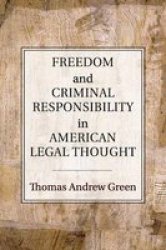Description
This book covers the history of the debate over free will and determinism in the context of criminal responsibility in the United States. The book discusses the various arguments made by different legal academics over the past century, and how they have tried to reconcile the idea of free will with the idea of determinism.
As the first full-length study of twentieth-century American legal academics wrestling with the problem of free will versus determinism in the context of criminal responsibility, this book deals with one of the most fundamental problems in criminal law. Thomas Andrew Green chronicles legal academic ideas from the Progressive Era critiques of free will-based (and generally retributive) theories of criminal responsibility to the midcentury acceptance of the idea of free will as necessary to a criminal law conceived of in practical moral-legal terms that need not accord with scientific fact to the late-in-century insistence on the compatibility of scientific determinism with moral and legal responsibility and with a modern version of the retributivism that the Progressives had attacked. Foregrounding scholars' language and ideas, Green invites readers to participate in reconstructing an aspect of the past that is central to attempts to work out bases for moral judgment, legal blame, and criminal punishment. Review: 'Thomas Green's Freedom and Criminal Responsibility in American Legal Thought delivers what its title promises, namely, over a hundred years of history of the debate among American legal academics and philosophers over the implications for criminal responsibility of the free will/determinism issue. Green comprehensively and critically surveys the views of all of the major and not-so-major contributors to this debate, from Roscoe Pound to Michael Moore and beyond. A tour de force.' Lawrence A. Alexander, University of San Diego School of Law 'A fascinating and illuminating study of the ways in which twentieth-century American legal academics (those concerned with both metaphysical truth and its implications for practical policy) grappled with the problems of free will and criminal responsibility. Green allows the authors he studies to speak for themselves, and thus brings out in admirably clear detail the contours and shifts of the debates within and between successive generations of thinkers.' Antony Duff, University of Minnesota Law School 'This deeply researched account of how twentieth-century legal thinkers have engaged with questions of freedom and responsibility is remarkable in its coverage and attention to detail. Green's close readings of the American texts - some well-known, many long-forgotten - and his careful explication of their contexts and meanings, vividly portrays how academic lawyers have struggled to make law's categories fit for practical use and also compatible with philosophical and scientific conceptions.' David Garland, New York University 'Freedom and Criminal Responsibility in American Legal Thought is a brilliantly imaginative and utterly original work of legal history. In it, Thomas Andrew Green surveys a century of American criminal law scholarship as, at bottom, a continuing and persistent conversation about the existence of free will. We learn of the paradoxes and the surprising twists and turns that swirled through debates over the nature and the meaning of criminal responsibility. No one interested in the legal or moral history of the twentieth century can afford to miss this book. Indeed, it will become a crucial resource for everyone engaged with moral, legal, or political thought.' Hendrik Hartog, Princeton University 'Thomas Green has written a brilliant, comprehensive, and fair-minded history of a century-long effort to ignore, reconcile, understand, and obfuscate a contradiction that lies at the heart of criminal responsibility. This is intellectual history at its very best. Green lets the participants in this crucial debate speak for themselves. His treatment of their arguments is unfailingly generous, thoughtful, fair, and wise.' Louis Michael Seidman, Georgetown University Law Center 'Green brilliantly reconstructs the long twentieth century's academic debate on the morality of punishing individual criminals in an age of determinism. While his intellectual protagonists ultimately made their peace with punishment, the questions that haunted them about responsibility, free
